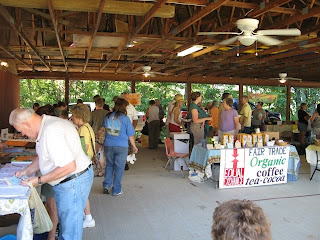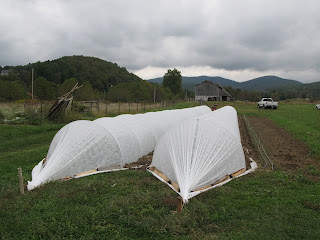The Community Garden Market in Philippi offers a unique single-point-of-sale system that easily allows all vendors to accept EBT with no training on their part. This was the first farmers market in the state to offer EBT. This market has a single cash register, and all produce is identified by a number that corresponds with the producer so the producer does not need to be present. Upon checkout, the cashier rings up the items with their respective numbers to ensure that each vendor is credited for the purchase of their produce. The customer then has the option of paying with cash, SNAP, Farmers Market Nutrition Program (FMNP) vouchers or WIC FMNP coupons. The producer does not need to be in attendance at the market because the market is operated similar to a consignment shop. The market manager staffs the cash register and producers pay a 20% fee to help cover the operations of the market and the market takes care of the rest with most producers receiving semi-monthly checks from the market.
The South Morgantown Farmers Market is a traditional farmers market by which the producers direct market their goods. At this market a token system is utilized for SNAP purchases. This is a very easy process where the customer simply swipes their card at the EBT/Credit Card table and tells the cashier how much they would like. The cashier then gives the redeemed amount in wooden tokens. Each token is worth $1. To make the distinction between EBT and Credit Card transactions they use two different color tokens. The customer can then take these tokens to any vendor they choose to redeem for food products. The vendor accepts the tokens and redeems them at the end of the day with the market manager. This system works incredibly well at this market and opens the wide variety of available produce to the SNAP participant. It is important to mention that this system works great at markets in which vendors direct market their products. At these markets, single-points-of-sale are not necessarily an option so tokens in lieu of several EBT machines is effective.

Offering SNAP has several important benefits. Firstly, it encourages low-income residents to shop at the farmers market. When people go to a farmers market for the first time, they are generally surprised by the affordability, and it encourages them to return, thereby creating long-term customers. By exposing SNAP participants to farmers markets it also helps to break down the idea that local produce is expensive. Secondly SNAP benefits increase the earning potential for the producer at the market. Many SNAP benefits are spent on non-local convenience food, and that money is the lost to the local economy. By spending SNAP benefits locally, at the market, it is actually a boost to the local economy through the injection of outside money. Furthermore, that money will continue to circulate within the local economy several times generating even more benefit. Simply by offering this free service to customers and vendors, these two markets have both increased the income-earning potential of their producers and laid the foundation for healthier, local food to be on local tables, no matter a family’s socio-economic status.
WesMonTy RC&D has assisted the food hubs with the supply issue by offering assistance on affordable season extension techniques; specifically low tunnels to the historically underserved community of farmers of North Central West Virginia. The purpose of supplying season extension materials to local producers is to lower their entry risk into enhanced farming techniques, and also to supply the local food hubs with produce earlier in the season as well as later. WesMonTy RC&D has distributed low tunnel materials to several local producers, and both earlier and later season produce holds the potential for greater income.






No comments:
Post a Comment